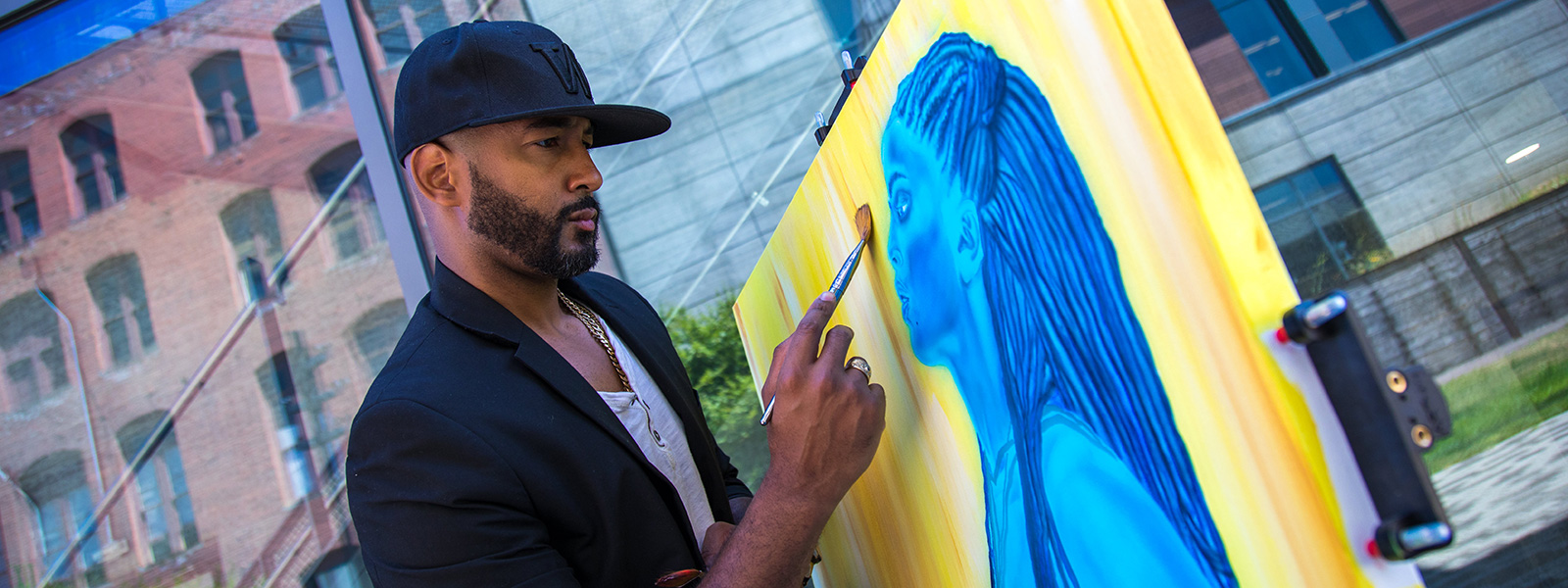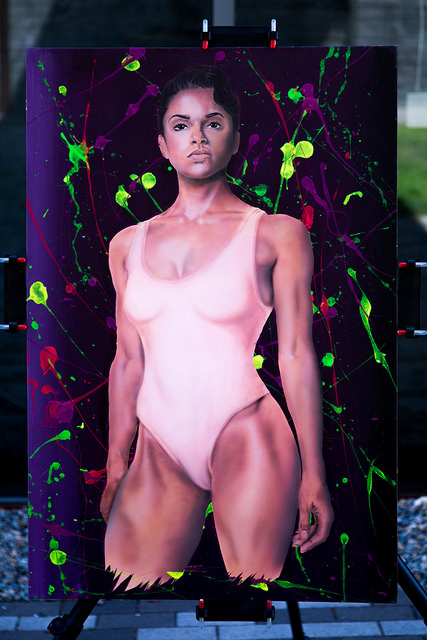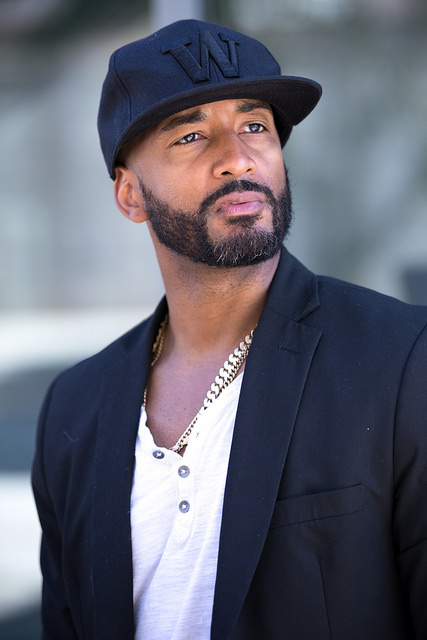
LeShawn Gamble: Portrait of an Artist
UW Tacoma student LeShawn Gamble has overcome traumatic injury and incarceration to become a leading voice and artist in the community.
(Photo above: LeShawn Gamble with his piece "Yemaya." The painting is part of his "Women in Color" series. Yemaya is the Goddess of the Ocean in the Yoruba religion.)
Update since we published this story in 2018: LeShawn Gamble is focused on growing his business, Renaissance 21, while he researches graduate schools. Gamble is interested in pursuing an advanced degree in clinical psychology.

LeShawn Gamble has always been an artist, even if he didn’t know it. “I was sitting in prison wasting time when this guy who was in there for murder saw me doodling on my notepad and he was like ‘you draw?’” said Gamble. This was 2007. Gamble had been convicted of marijuana possession. Washington State has since legalized the sale of marijuana but not before Gamble spent a year in Stafford Creek Corrections Center.
Gamble thought about the question asked of him. “I told the guy yeah but I didn’t do it professionally and he asked ‘why not, you have nothing but time.’” The man later asked Gamble if he would design a tattoo for him. “He’s in there for the rest of his life and he still wanted my art,” said Gamble. “That’s when I realized I had the ability to impact people in ways I didn’t even think about.”
More than a decade later Gamble is using his skills to help others. He started Renaissance 21, whose focus is “equity through utilizing art, mentorship, education and entrepreneurship.” Renaissance 21 includes a program geared toward young people. “I’m teaching disenfranchised youth how to use art as a tool for healing and therapy,” said Gamble.
Gamble describes his own childhood as traumatic. He grew up in Virginia and attended South Carolina State on a track scholarship. “My mom was going through a divorce at the time and ended up living in these really bad apartments,” said Gamble. “This little girl who lived two buildings away was raped and murdered.” Gamble left college and joined the Army so he could help his mother buy a house.
An incident in the military altered the course of Gamble’s life. He was stationed in South Korea. ‘I stepped in to help another soldier and got ambushed by a group of guys in my unit,” said Gamble. “I was kicked in my head and stomped over the entirety of my body. I suffered nerve damage and have migraines severe enough where I can’t see sometimes.”
"I don't ignore the needs that I see. If I go to a community and I see that they need something I don't say I'm ‘going to do this, I say well what do you need’? Then I let that guide my path. It's very different approach. I think people look at something and say they need this. Versus, asking the people in the community what do you need and then letting them guide you on your journey."
— LeShawn Gamble
The pain from his injuries led Gamble to, in his words, “self-medicate” with marijuana. “I’d been out of the military about a month when I got arrested,” he said. “It took me almost ten years from when I got released to get my life back to even.” Gamble struggled to find work upon release. He submitted countless resumés and applications but never heard back. “I finally got a job detailing cars,” he said. A friend of Gamble’s eventually helped him land a job at McNeil Island Corrections Center. A few years ago another friend, Drea Baines, stepped in to help Gamble get a business license to start Renaissance 21.

Gamble returned to school in 2014 and pursued an associate’s degree at Tacoma Community College. He transferred to UW Tacoma in the fall of 2016 to pursue a degree in psychology. “I chose this major because I saw generational trauma in my own family and in the families of others,” said Gamble. “I want to take the tools I learn here and partner with other people who have the same ideas and build something that is really about healing people who are underrepresented in society.”
While on campus Gamble has found guidance from different people including Associate Chancellor for Community Engagement Linda Ishem, Professor Carolyn West, Academic Advisor Leisa Schmidt and Associate Professor Deirdre Raynor. “It’s empowering to meet people like Dr. Raynor,” said Gamble. “I look at her and I see family.”
Gamble graduates in 2019. His desire to succeed stems from a stubbornness to make things better for himself and for his son. “I have an eight year old and he’s tenderhearted, he’s sweet,” said Gamble. “I’m trying to show him how to be someone who brings beauty into the world.”
This past spring Gamble took his first art class. “I was pretty much self-taught,” he said. Gamble learned from part-time lecturer Jewel Castro. “She introduced me to a process that I was unfamiliar with,” said Gamble. “It made me uncomfortable so I know that it helped me grow. I always try to put myself in positions that I may not want to be in but I know I have to be in them.”



